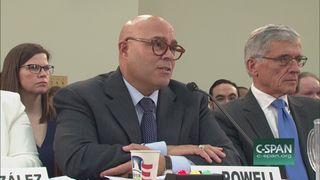Net Rereg Could Be in Political Cards

WASHINGTON — There appears to be general agreement among Republicans, Democrats, activists and internet service providers that they can now live with restoring the FCC’s authority to enforce specific network neutrality rules.
That would undo the recent Restoring Internet Freedom Order championed by Federal Communications Commission chairman Ajit Pai and hailed by those same ISPs. Now, Pai has signaled that he would also be OK with Congress stepping in to settle the issue of FCC authority.
But getting there from the political “here” of Title II vs. Title I, ISPs vs. activists, and Democrat vs. Republican still seemed a tough row to hoe after last Thursday’s inaugural House Communications Subcommittee hearing on the issue under Democrats, and despite much talk of bipartisan compromise.
NCTA: The Internet & Television Association president Michael Powell said the association fully supported restoring the rules under the 2015 Open Internet Order, but not under Title II of the Communications Act and not including the “general conduct standard” that gave the FCC the power to regulate beyond those specific rules against blocking, throttling and paid prioritization.
Republicans even proposed three new (well, new and recycled) net neutrality bills, all of which would restore those three basic rules — though, again, not under Title II and with no “general conduct standard.”
But some Democrats remain wedded to Title II, even though Congress could come up with a new title to the Communications Act that would explicitly spell out the FCC’s authority.
Here are some of the issues that need to be resolved to get to a kumbaya moment, rather than return to the Groundhog Day cycle of legal challenges.
Multichannel Newsletter
The smarter way to stay on top of the multichannel video marketplace. Sign up below.
1.Including edge providers in new net neutrality rules. Powell said that a serious effort at legislating neutrality rules would be a “hollow promise” without such parity.
2.Title II vs. non-Title II authority. Some top Democrats remain wedded to Title II, while Republicans will not sign off on any legislation based in what they brand as rotary phone-era regulations in an iPhone world.
3.Bright-line rules. Democrats fear limiting the new rules to blocking, throttling and paid prioritization, not under Title II and without the general conduct standard, is too limiting, allowing ISPs to find ways to circumvent them.
Powell, a former FCC chair whose open internet “four freedoms” provided the basic net neutrality principles behind later efforts to regulate, advocated for a fresh start, saying NCTA’s stance on rules had evolved. He told Congress the new rules should be derived from a clean sheet of paper up, rather than the “historical mountain” of Title II down.
Contributing editor John Eggerton has been an editor and/or writer on media regulation, legislation and policy for over four decades, including covering the FCC, FTC, Congress, the major media trade associations, and the federal courts. In addition to Multichannel News and Broadcasting + Cable, his work has appeared in Radio World, TV Technology, TV Fax, This Week in Consumer Electronics, Variety and the Encyclopedia Britannica.

